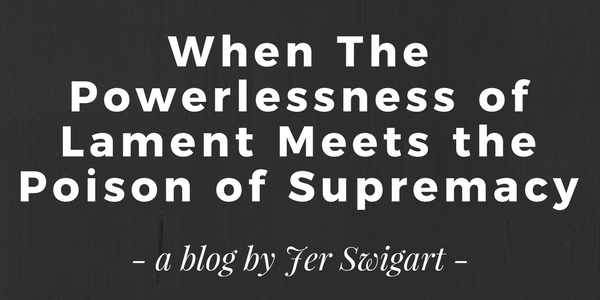A week ago today, Jon and I walked into a room filled with dignitaries from Muslim majority countries: Algeria, Jordan, Egypt, Iraq, Palestine, Sudan, and others. We had been invited to speak on a panel emphasizing interfaith participation in immigrant justice, were honored to be invited, and looked forward to the conversation.
The room was a mixture of tension, fatigue, and distrust. Our international colleagues had been in the country for seven days on a State Department-sponsored leadership & democracy tour. They had spent hours in meetings with political leaders who offered them a steady diet of uninspiring platitudes and predictable party lines.
As introductions made their way around, it became clear that our global guests were disinterested in talk about immigration. What they wanted was an honest, unfiltered conversation about the surge in Islamophobia and its connection to our seemingly Christian government’s rhetoric on Islam, terrorism, and Jerusalem.
The panel began with our friend, a local Muslim Imam whose leadership is setting the tone for collaboration and compassionate, faith-informed activism in San Diego. As he spoke to them in Arabic, Jon and I listened through translation and were inspired by the integration of Imam Taha’s faith and practice. Because he spoke to them in their own language, they eagerly received his input. The interactions that followed exposed both their frustration and curiosity. Muslim bans, the declaration of Jerusalem as Israel’s eternal capital, and the ongoing location of “terror” upon Arab Muslims by our administration had further destabilized their people.
As the panel progressed from the Muslim Imam to local Christian leaders, the distrust returned to the room. Our Christian colleagues stuck with their talking points on immigrant justice and how faith is fueling uncommon friendships and renovating local policies. It was excellent content, but the room continued to freeze over.
The conversation eventually made its way to our end of the table where Jon and I were discerning the same hunch: it’s likely that our Muslim colleagues viewed us as classic white evangelicals and appeared to be bracing themselves for the non-generous, aggressive platitudes of American Christianity that make their lives a living hell.
Rather than speaking to immigrant justice, we both pivoted to what we thought our global relatives wanted to explore.
We began by lamenting how twisted the collective white American Christian soul had become. We offered our perspective on how this has happened, how we’ve experienced, first-hand, the tragic implications of our supremacist theology, how this theology has shaped American politics, and how we’ve benefited from it.
Jon and I spoke openly about how this administration’s Muslim ban and the Jerusalem declaration had nothing to do with international diplomacy and everything to do with seducing the accolades of its base: a radicalized religious right who live with a fabled theology informed by white supremacy and are fueled by power and fear toward a convenient, self-serving conclusion.
We articulated our regret over Christian support for Trump’s ongoing ignorance, racism, and hatred and spoke to the hopeful alternative to contemporary white Christianity that Global Immersion is seeking to live and narrate…an alternative that is oriented around Jesus the Nazarene rather than his Americanized & suburbanized counterfeit. We spoke of this way of life that is marked by creative love, uncommon friendships, and restorative nonviolent action.
As we critiqued our own story, the room began to thaw. When we asked for their forgiveness, we were met with a stunned silence.
That’s when a Palestinian sister, a strategic planner in the Ministry of the Interior, spoke up:
Until this moment, I have been devastated by what I’ve heard from Americans. I came here hoping that the destabilizing vile & vulgar influence was limited to one person. Sadly, I have heard nothing but widespread support for his perspective and policies…until now. This is the first time in seven days that
I’ve heard thoughtful resistance. And that it came from the most unlikely voices on the panel grows my hope.
With her words, suspicion turned into embrace. In that moment, friendship was born.
In the wake of that experience, three key discoveries have surfaced that inform how we live the hopeful alternative within today’s divided world:
Homogeneity is an expression of our idolatry of safety that is killing all of us.
Rhetoric about “those” people of “that” tradition is a poison that has seeped into all of us and is deceiving us toward a slow death by sameness. The only antidote to this poisonous rhetoric is the tireless pursuit of uncommon friendship. May we do whatever we need to do to find ourselves around tables with people who are different than “me.” Is this not the radical, relational way of Jesus
Our ability to critique our own story is the key that unlocks uncommon friendships and unlikely collaborations.
Holding to the unquestionable superiority of my story, my perspective, my tradition, and my understanding forces me into defensiveness and reduces my curiosity. May we grow in our ability to listen longer than feels comfortable, utilizing the very simple invitation, “Tell me more.”
Jesus, more so than justice, inspires the imaginations in all of us.
Simply living the teachings of Jesus (i.e. examine the log in your own eye) throughout the course of the panel transformed cynical global leaders into generous collaborators. In the case of this particular interaction, leading with justice didn’t generate relationship. It was Jesus in us that shaped our thoughts, words, and presence such that we became suitable partners for the work of justice.
May we orient ourselves around Jesus such that justice becomes the very expression of our lives.
 Author: Jer Swigart – Cofounding Director of Global Immersion Project
Author: Jer Swigart – Cofounding Director of Global Immersion Project

